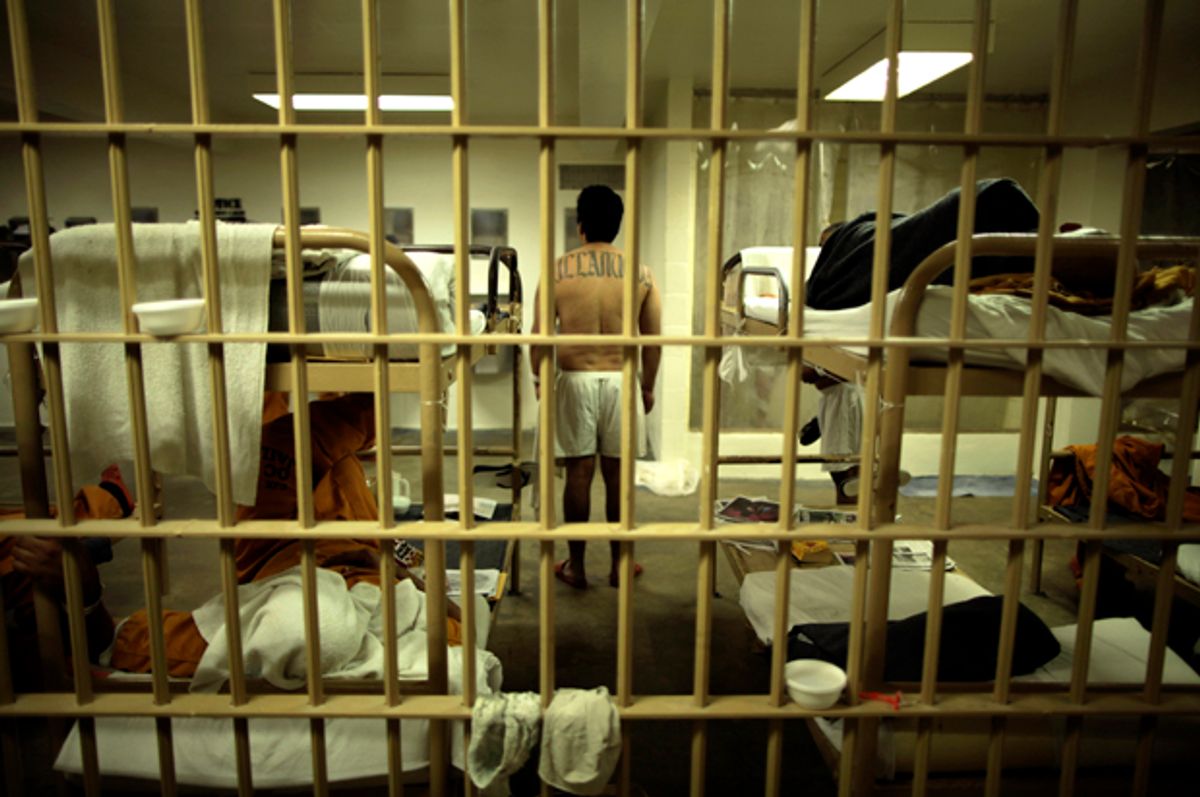Texas prisoners work in a variety of jobs for no pay, in what a prisoner has described as a form of "modern-day slavery."
Jason Renard Walker, a man incarcerated in Amarillo, Texas, published a letter this week in Truthout titled "Unpaid Labor in Texas Prisons Is Modern-Day Slavery."
Walker noted Texas prisoners work as electricians, maintenance workers, cooks, janitors, painters and dog trainers. They tend to more than 10,000 head of cattle, raising and processing beef, pork and chicken. They also grow 24 different crops, and manufacture soap and clothing.
Prisoners, Walker said, are "required" to do this labor for free. "If they refuse, they receive discriminatory punishment and thus longer stays in prison," he wrote.
Some prisoners work up to 12 hours a day, without pay. "This is flat-out, modern-day slave labor and it will continue as long as society accepts the notion that prisoners deserve less," Walker said.
Black Americans are very disproportionately affected by what Walker described as this system of modern-day slavery. The Texas prison population is roughly evenly split racially, with about one-third of its inmates black, one-third white and one-third Latino. According to the 2015 census, however, just about 13 percent of the Texas population is black, while 43 percent is non-Hispanic white and 39 percent is Latino.
Texas has the biggest prison population in the U.S. and more facilities than any other state, with more than 143,000 people incarcerated in 124 prison units.
"It is also known for being one of the most self-sufficient and profitable prison systems in the nation, thanks to prison labor," Walker said.
This prison labor is overseen by Texas Correctional Industries, a department established in 1963 that's within the Texas Department of Criminal Justice.
According to the Texas Department of Criminal Justice's 2014 annual report (the most recent one available), Texas Correctional Industries made $88.9 million in sales in fiscal year 2014.
The report noted that Texas Correctional Industries operates 37 facilities, producing a variety of products, including mattresses, shoes, garments, brooms, license plates, printed materials, janitorial supplies, soaps, detergents, furniture, textile and steel products.
Texas Correctional Industries also provides numerous services, such as furniture refinishing, tire retreading and auditorium and school bus refurbishing.
It says one of its goals is to "reduce department cost by providing products and services to [the Texas Department of Criminal Justice] while selling products and services to other eligible entities on a for-profit basis." Giving inmates "marketable job skills" and "help[in] reduce recidivism" are other goals.
Prisoners manufacture these goods and provide these services, Texas Correctional Industries says, for state and local government agencies, political subdivisions, public education systems and public and private institutions of higher education.
Salon contacted Texas Correctional Industries with a request for comment on Walker's letter and was told to contact the Texas Department of Criminal Justice public information office.
Robert C. Hurst, the public information officer at the department, told Salon, "We’re not going to comment specifically on his letter."
Hurst did, however, speak in general terms about Texas Correctional Industries: "Part of the core mission of the agency is to promote a positive change in their behavior and prepare them for re-entry into society. We believe having a job is critical to their long term success," Hurst said.
"While inmates are not paid, they can acquire marketable job skills which could lead to meaningful employment upon their release," Hurst added. "Offenders can also receive good conduct time for participating in work and self-improvement programs while incarcerated. For many — but not all — offenders, 'good time' credits may be added to calendar time served in calculating their eligibility for parole or mandatory supervision."
In his letter, Walker pushed back against these claims. "Whenever TCI is scrutinized by the public for this practice, they note that prisoners receive other rewards for their labor, such as time credits called 'Good Time' or 'Work Time,'" he said.
"On paper, these credits are supposed to cut down the prisoner's sentence and allow them to be released on mandatory supervision — earlier than they would if these credits didn't exist. But in reality, mandatory supervision is discretionary," Walker said. "This means that the parole board doesn't have to honor these credits. It can keep denying a prisoner's release until they have served their entire sentence."
In his statement to Salon, the public information officer at the Texas Department of Criminal Justice defended the work program as a way to train inmates.
"There are a wide variety of jobs within the prison system much like those beyond the perimeter fence," Hurst said. "Offenders may be assigned to work in support positions, such as cooking, cleaning, laundry, and maintenance. The agency also has a one of the largest agricultural operations in Texas helping supply food and clothing to the offender population."
Hurst said more than 5,000 inmates are assigned to Texas Correctional Industries, which "offers specialized training in a number of areas including braille transcription, warehouse operations, printing-graphic design and wielding."
In his letter, Walker called this program a "money-making scheme."
"Prisoners are human," Walker wrote. "Prisoners deserve the same rights as people on the outside. We are more than the dregs of society and dead weight. In fact, we are actually keeping the prison system functioning with no pay."
Walker concluded: "All work and no play is inhumane under any circumstances. And prisoners must be paid for their labor."
The movement against prison labor is growing. Citing prison labor — along with problems like long-term solitary confinement, inadequate health care, overcrowding and attacks — incarcerated people throughout the U.S. organized a national prison strike that began this week, on the 45th anniversary of the uprising at Attica prison. Inmates in at least 40 facilities in 24 states are participating.

Shares